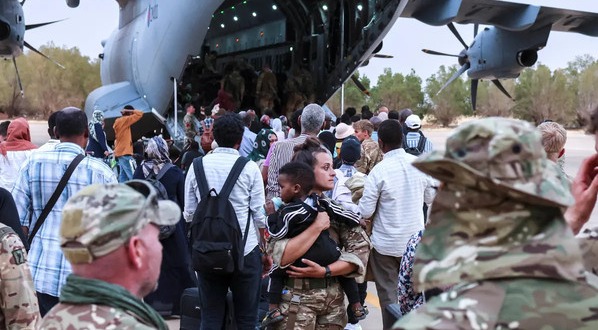Sudan is in the spotlight as it continues to face waves of violent clashes. While the country looked to transition to democracy, it has been derailed by a power struggle between two armed groups, the army and the paramilitary unit known as the Rapid Support Forces (RSF). The deadly conflict initiated by the two sides on April 15 has left civilians caught in the crossfire. As of May 9, the violence has left at least 700 people dead, over 5,100 injured, and millions of people on the brink of displacement.

To completely comprehend what is going on, one must first understand Sudan's political past. For decades, the country was ruled with an iron hand by a single man, Omar al-Bashir, who came to power in a military coup in 1989. Under al-Bashir’s reign, military general Abdel Fattah al-Burhan and RSF’s leader Mohamed Hamdan Dagalo, more commonly known as Hemedti, worked together. Hemedti led a militia then known as the Janjaweed, which was commissioned by al-Bashir's army to fight rebels. The militia rebranded as the RSF in 2013 and continued working with the army on different missions. However, due to years of drastic economic challenges, anger towards al-Bashir’s government spread widely across the nation. In 2019, motivated by the mass protests, Hemedti and General al-Burhan joined forces to overthrow al-Bashir. The army agreed to share power with various political groups in a provisional government that would oversee the transition to democracy.
Not long after, the army seized power again resulting in a transfer of power to the military led by General al-Burhan. The army later discovered that the RSF was expanding, with Hemedti harboring his own political ambitions. It had made significant investments both within and beyond the country, mainly in the gold trade. General al-Burhan worried that the RSF would become uncontrollable if they were not forcefully integrated into the army. Tensions between the army and the RSF grew over time, particularly over the schedule of integrating the RSF into the army. The army requested two years, whereas the RSF preferred ten. This brings us back to the conflict right now. It is unclear who instigated the fighting, but both sides accused the other of attacking their bases in mid-April.
The full-fledged confrontation between the army and the RSF has resulted in a humanitarian disaster, with hundreds of people killed, thousands injured, and basic necessities such as water and power cut off. Khartoum, Sudan’s capital, has seen the strongest warfare, with numerous air raids and shelling. The airport has been heavily damaged, and food supplies are running low. The total economic disturbance has left many Sudanese struggling to make ends meet, aggravating an already precarious position brought on by years of international sanctions.
The international community, including the United Nations Security Council, African Union, and European Union, has called for the bloodshed to be brought to an immediate halt. Despite these calls for peace, Sudan's situation remains dire. Internationally-mediated ceasefires have been agreed upon by both sides, although the continuous reports of battling suggest otherwise. Currently, foreign nationals, dual citizens, and some native Sudanese are being evacuated into neighboring countries such as Chad, Egypt, South Sudan, and Ethiopia, or their respective home countries.
Sudan's turmoil serves as a reminder of how fragile democracy is in many parts of the world. The strides Sudan has made toward a more democratic system of government in recent years have been easily undermined by the power struggle between the army and the RSF, leaving the country in limbo. The international community may help find a peaceful solution to the issue by giving humanitarian aid to people affected by the violence and using diplomatic pressure to encourage both parties to engage in meaningful conversation. But in the end, the fate of Sudan's democratic transition will still be determined by the army's and RSF's ability to set aside personal rivalries and unite toward a single purpose. The Sudanese people have endured far too long seeing their democratic progress be built and reduced to rubble over and over again. What they deserve is an accountable government that acts in their best interests. Unfortunately, it is a hope that seems more distant now than ever.

